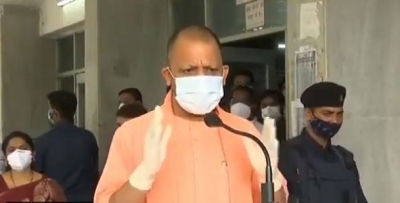Population stabilisation plan of UP govt welcomed
By IANS | Published: July 11, 2021 04:06 PM2021-07-11T16:06:03+5:302021-07-11T16:20:07+5:30
Agra, July 11 The proposed plan to stabilise population in Uttar Pradesh by the Yogi Adityanath government ahead ...

Population stabilisation plan of UP govt welcomed
Agra, July 11 The proposed plan to stabilise population in Uttar Pradesh by the Yogi Adityanath government ahead of the Assembly elections next year, has received mixed reactions. This could in fact become a major poll plank, feel poll watchers. Already the plan has triggered an intensive debate in political circles.
A proactive policy initiative to encourage people to opt for smaller families should have salutary effects, on the quality of life in general and usher in much needed socio economic reforms. Parents with one or two children will be suitably rewarded in a number of ways, according to a note in circulation for discussion.
While enlightened public opinion favours the proposed strategy, rumblings of concern are being articulated by the representatives of the minority community and the opposition parties in the state.
But most experts and academics agree that the population pressure in Uttar Pradesh has to be defused if any meaningful headway is to be made to impart momentum to developmental activities.
India, with a current population size of 1.37 billion, has the second largest population in the world. By 2027, we are expected to overtake China to become the most populous country.
"The constant decline in fertility and mortality in India during the 1980s has brought a positive change in the age structure of population and has resulted in a huge young force of human capital and the trend will remain until early 2030, says Dr Dhirendra Kumar (Population Scientist and Dean, IIHMR University).
Investments in the future of the youth population is critical because caste dynamics and social mores inhibit the opportunities to access education, health, nutrition, employment, and empowerment, especially for women and girls. States like Kerala, Tamil Nadu and Andhra Pradesh have successfully proved the importance of investing in education and improving access to quality healthcare in order to achieve population stabilisation.
Many experts opine that coercive population control measures are not the solution and could instead lead to a potential increase in sex selection practices. This could have a negative impact on the Child Sex Ratio, affecting Central Government campaigns such as the Beti Bachao Beti Padhao programme.
China recently rescinded its stringent population policy, having found itself in the midst of a population crisis. On the other hand, neighbouring Sri Lanka successfully stabilized fertility rates by simply increasing the age at marriage, a move that was made more effective by ensuring girls were educated, says political commentator Paras Nath Choudhary.
Strategists say that increased access to education, economic and other development opportunities, lead to fertility decline.
For the country's youth population, family planning and access to contraceptives is a critical element of the primary care component, given its crucial role in delaying first births, ensuring spacing between births, lowering maternal and child mortality, and preventing unsafe abortions, says social activist Mukta Gupta.
Divya Santhanam of the Population Foundation of India says, "Keeping girls in schools and increasing the number of years girls remain in school, can have a huge impact on the health and wellbeing of the population, particularly among young people. This helps in delaying the age at marriage/cohabitation and increasing the interval between marriage and the first pregnancy.
"We need to expand the range and reach of the current basket of contraceptive choices, and consider adding more Long-Acting Reversible Contraceptives (LARC), which are critical in view of our large population of young people."
Population dynamics experts suggest stabilisation of population is a better idea than population control in the longer run.
Big states like Uttar Pradesh, however, have little choice but to go ahead with appropriate legislative measures to discourage families from opting for more than two children, says Rajiv Gupta of Lok Swar. Any delay in implementing a new population policy, will prove detrimental, Gupta adds.
Disclaimer: This post has been auto-published from an agency feed without any modifications to the text and has not been reviewed by an editor
Open in app